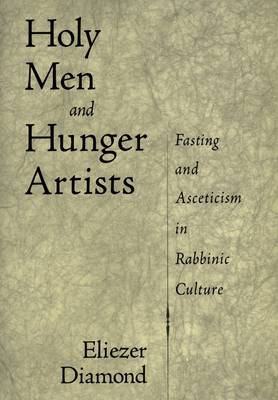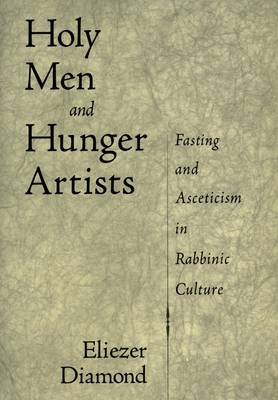
Door een staking bij bpost kan je online bestelling op dit moment iets langer onderweg zijn dan voorzien. Dringend iets nodig? Onze winkels ontvangen jou met open armen!
- Afhalen na 1 uur in een winkel met voorraad
- Gratis thuislevering in België vanaf € 30
- Ruim aanbod met 7 miljoen producten
Door een staking bij bpost kan je online bestelling op dit moment iets langer onderweg zijn dan voorzien. Dringend iets nodig? Onze winkels ontvangen jou met open armen!
- Afhalen na 1 uur in een winkel met voorraad
- Gratis thuislevering in België vanaf € 30
- Ruim aanbod met 7 miljoen producten
Zoeken
Holy Men and Hunger Artists
Fasting and Asceticism in Rabbinic Culture
Eliezer Diamond
Hardcover | Engels
€ 136,45
+ 272 punten
Omschrijving
The existence of ascetic elements within rabbinic Judaism has generally been either overlooked or actually denied. This is in part because asceticism is commonly identified with celibacy, whereas the rabbis emphasized sexuality as a positive good. In addition, argues Eliezer Diamond, it serves the theological agendas of both Jewish and Christian scholars to characterize Judaism as non- or anti-ascetic.
In fact, however, Diamond shows that rabbinic asceticism does indeed exist. This asceticism is mainly secondary, rather than primary, in that the rabbis place no value on self-denial in and of itself, but rather require of themselves the virtual abandonment of familial, social, and economic life in favor of an absolute commitment to the study of the Torah. It is an asceticism of neglect, rather than negation. He also notes that this asceticism of neglect dovetails with the rabbinic theology of sin and punishment, which encourages delaying gratification in this world in the hopes of a greater reward in the next. The rabbis believed, moreover, that every pleasure taken in this world detracts from what awaits one in the future.
The rabbis valued and occasionally engaged in primary asceticism as well. In fact, as Diamond shows, the vocabulary of holiness was often used by the rabbis in connection with voluntary self-denial. One form of primary asceticism--fasting--became increasingly popular in the wake of the destruction of the second temple. He traces this development to the need to mourn the temple's devastation but also to the cessation of three forms of temple-related rituals: the sacrificial cult, the Ma'amadot (groups that would fast, pray, and read from the Torah while daily sacrifices were offered), and naziritism. Fasting is linked by the rabbis to each of these practices and Diamond shows that fasting was seen as a substitute for them after the temple was destroyed. In a final chapter, Diamond shows that there is a greater tendency toward asceticism among the Palestinian rabbis than among the Babylonian. He contends that the divergent political histories of these communities as well as differing external cultural influences account for this disparity.
In fact, however, Diamond shows that rabbinic asceticism does indeed exist. This asceticism is mainly secondary, rather than primary, in that the rabbis place no value on self-denial in and of itself, but rather require of themselves the virtual abandonment of familial, social, and economic life in favor of an absolute commitment to the study of the Torah. It is an asceticism of neglect, rather than negation. He also notes that this asceticism of neglect dovetails with the rabbinic theology of sin and punishment, which encourages delaying gratification in this world in the hopes of a greater reward in the next. The rabbis believed, moreover, that every pleasure taken in this world detracts from what awaits one in the future.
The rabbis valued and occasionally engaged in primary asceticism as well. In fact, as Diamond shows, the vocabulary of holiness was often used by the rabbis in connection with voluntary self-denial. One form of primary asceticism--fasting--became increasingly popular in the wake of the destruction of the second temple. He traces this development to the need to mourn the temple's devastation but also to the cessation of three forms of temple-related rituals: the sacrificial cult, the Ma'amadot (groups that would fast, pray, and read from the Torah while daily sacrifices were offered), and naziritism. Fasting is linked by the rabbis to each of these practices and Diamond shows that fasting was seen as a substitute for them after the temple was destroyed. In a final chapter, Diamond shows that there is a greater tendency toward asceticism among the Palestinian rabbis than among the Babylonian. He contends that the divergent political histories of these communities as well as differing external cultural influences account for this disparity.
Specificaties
Betrokkenen
- Auteur(s):
- Uitgeverij:
Inhoud
- Aantal bladzijden:
- 240
- Taal:
- Engels
Eigenschappen
- Productcode (EAN):
- 9780195137507
- Verschijningsdatum:
- 20/11/2003
- Uitvoering:
- Hardcover
- Formaat:
- Genaaid
- Afmetingen:
- 177 mm x 228 mm
- Gewicht:
- 566 g

Alleen bij Standaard Boekhandel
+ 272 punten op je klantenkaart van Standaard Boekhandel
Beoordelingen
We publiceren alleen reviews die voldoen aan de voorwaarden voor reviews. Bekijk onze voorwaarden voor reviews.











